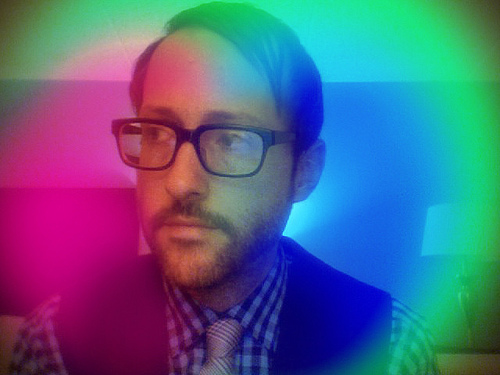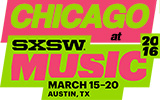| « Pitchfork Festival's Iceage Guitars Stolen | Pitchfork Music Festival: Friday » |
Pitchfork Music Festival Sat Jul 14 2012
Conversations at Pitchfork: eMusic Editor-in-Chief J. Edward Keyes

If you've attended the Pitchfork Music Festival since the event started back in 2005, you are probably familiar with eMusic. The online music subscription site has been a supporter and sponsor of the festival since the beginning. It's no surprise, since eMusic and Pitchfork share very similar ideas on finding quality new music. Full disclosure, I've been a paying member on the site for years now, and I'm a huge fan of the catalog of music they have. Sure, I can find many popular hits on there, but I've also found a lot of under the radar bands, mainly thanks to their lovingly crafted editorial content.
This year eMusic has brought to the festival a contraption they've designed called the Electromusical Energy Visualizer. Basically you walk into a booth, put on headphones that pump out selected Pitchfork Festival artists, and then a machine snaps photos of your aura while listening to each artist. The machine prints out a photo for you to keep, and your aura can be read for you. It's a cool concept to explore how music affects us in more than one way, and we'll have up in a bit our own experience getting our aura photos taken yesterday at the festival.
Before the weekend kicked off, we got a few moments to chat with eMusic Editor-in-Chief J. Edward Keyes about the Electromusical Energy Visualizer, the festival itself, and the bands he suggested were the best bet to check out this weekend. Check out our interview after the jump.
Gapers Block: In many ways, eMusic and Pitchfork tend to break artists in a similar fashion. Pitchfork writes about the bands they really love, and adds somewhat obscure acts to their stage every festival year. Whereas at eMusic you have, since day one, really pushed editorial content that focuses on bands you love as opposed to just selling a product, for example the eMusic Selects series. What's the importance from an editorial standpoint to balance breaking an act you love but also being a viable business? How does a site like you or Pitchfork for that matter balance both?
J. Edward Keyes: Basically, to me, the two are inextricable. You build trust with your audience by constantly endorsing artists and albums that you love, and that you're convinced they'll love. I think there's something to be said for a heartfelt, sincere, passionate endorsement of a band. At a time when music coverage is more splintered than ever, I actually think the main way you build an audience is to have a distinct, unique, sincere and impassioned voice -- one that stands out from the crowd. That's what I've always tried to do here at eMusic, and I know the staff at Pitchfork does the same.
GB: You said before that the key to eMusic is curation, which is very similar to the formula for success with the Pitchfork Music Festival. In a live music culture that is saturated with a formulated type of festival experience, how important is this attention to detail for success? What about Pitchfork Festival appeals to you and what do you think appeals to the general public vs. a larger mainstream festival?
JEK: I think the first part of your question goes back to some of what I mentioned above -- a distinct, unique, sincere point of view is everything. The appealing thing to me about Pitchfork is the fact that it is so expertly curated -- not only do they select artists from every genre, but they also purposefully seem to select artists that are moving the genres forward. I am an extremely restless music listener, and so many larger festivals present the same humdrum clutch of bands in order to cast the widest possible net. I've always knee-jerked against that, somewhat. Pitchfork's lineup is more about focusing on where music is going, not where it's been, or even where it is right now. That's my personal sensibility, too, and it's one of the reasons I love the festival so much.
GB: What set are you looking forward to the most? What, from your knowledge of the acts, will be solid bets for great sets?
JEK: Where to begin! First things first: if you've never seen Cloud Nothings, Thee Oh Sees, The Men or Ty Segall, those should be near the top of your list. Close behind them should be A$AP Rocky and Danny Brown, who are both unbelievably charismatic performers. I've also seen Atlas Moth several times, and have always been completely blown away. They're a great example of what makes Pitchfork so special -- they're a hard rock band who aren't afraid to incorporate elements of psych and space rock into their songs. They're one of my favorites. We just wrote a great guide to this year's festival, which you can check out here.
GB: I think many people aren't aware how many senses music affects in our bodies. The eMusic Electromusical Energy Visualizer and some of your new experiments with artists and their music is setting out to bring awareness to how music can affect us on a multitude of levels in a creative and playful way. Outside of sound, what is an unexpected use of your senses that you've experienced through music?
JEK: Honestly, music triggers a whole host of emotions in me. There's music I relate to -- the new record by Allo Darlin', for example, feels like it was handwritten with me in mind. I feel those songs deep inside me every time I listen to it. The same with the Cold Specks record -- each of those songs feel like a letter written personally to me -- every song makes me feel hopeful. And then there are just pure visceral reactions -- Death Grips, for example, makes me feel incredible energized.
GB: Chicago has a thriving festival scene that is continuing to grow, and really started with the rise in popularity with Pitchfork and Lollapalooza. How does a setting like Chicago differ than other locales around the nation for destination festivals? What, in your opinion, keeps this scene sustaining and growing each year?
JEK: Chicago has such an unbelievable music history. When I was growing up and started buying music, you basically knew that if a record came out on Thrill Jockey or Touch & Go, you bought it, no questions asked. And then the deeper I got into music, the more all roads seemed to lead back to Chicago. Just take a quick look at the Chess Records discography and you'll see just how rich Chicago's musical history is. It's also home to one of my favorite current record labels, HoZac, as well as one of the best record stores in the country, Dusty Groove.
GB: Being a music writer and editor, you've attended your fair share of festivals. What is something about Pitchfork Music Festival that makes it stand out or is unique compared to other similar events?
JEK: Unlike other festivals, I know that when I go to Pitchfork, I am guaranteed to hear something I've never heard before. Also, it's just spectacularly well-organized. The food selection is above and beyond standard festival fare -- it's actually food you want to eat. And a simple stroll through the festival's merch tent instantly reveals how different Pitchfork's DNA is: you've got tables by local artists and companies, and you've got a mind-blowing selection of vinyl from nearly every label or store imaginable. It speaks to Pitchfork's commitment to supporting visions, not the bottom line. It's a concept we at eMusic share 100 percent.
Keep checking back for more conversations with artist at Pitchfork Festival 2012.















